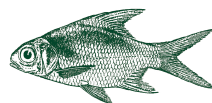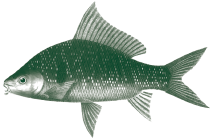Mekong fisheries index
Catfish plan threatens trade war between
US and Viet Nam
AFP - 7 August 2009
After years of arguing that Vietnamese catfish isnít catfish - so that it attracts a U.S import tarrif - and winning a federal law saying as much - fish farmers in the U.S now seem to have changed their minds. Under their latest lobbying strategy, they want the Vietnamese imports considered catfish so that they will be covered by new tougher inspections regimes that were pushed through Congress last year as part of the 2008 Farm Bill.
The move could block Vietnamese imports and risks a broader trade war says the AFP story. Since June last year, the FDA has rejected catfish products imported from China, Thailand and Vietnam a total of thirty one times. Thailand was responsible for two refusals, China was responsible for thirteen, and Vietnamese catfish products were rejected a total of sixteen times. These rejections could increase if the lobbying tactic is successful.
The AFP says that if the Obama administration signs off on the plan, the fish that's long been a staple of Southern cooking and is a significant export earner for Viet Nam could unravel years of improving relations between the U.S. and its former enemy.
The inspections feud is the latest in a long-running battle between a $400 million domestic farm sector that raises catfish in ponds across the Mississippi Delta and a burgeoning industry in Viet Nam, where fish are raised in ponds and cages - many along the Mekong River.
The U.S. industry - mostly located in Mississippi, Alabama and Arkansas - has had a string of successes on Capitol Hill and in Southern legislatures.
Along with winning frequent federal aid, it pushed a labeling law through Congress in 2002 that forced the Vietnamese fish to be sold in the United States under less familiar names to consumers, such as pangasius, basa or tra. A year later, it won an antidumping case authorizing tariffs of up to 64 percent on the Vietnamese fish. The southern states where most catfish farming is done now require restaurants to disclose where their fish was raised..

MRC calls for public submissions on
proposed Mekong hydropower schemes
14 July 2009 Ė MRC Press Release
The Mekong River Commission (MRC) has established a web page to allow the public to make submissions regarding the 11 hydropower schemes proposed for construction along the mainstream Mekong.
The submissions, which can be made at http://www. mrcmekong.org/ish/hydro-submit.asp or by post or fax, will provide input to the MRC's Strategic Environmental Assessment that is looking at the wider economic, social and environmental implications of the proposed dams in Cambodia, Laos and Thailand. MRC member countries will use information presented by the study to guide their decisions on these projects.
Jeremy Bird, Chief Executive Officer of the MRC Secretariat, said that Mekong governments (include Cambodia, Laos, Thailand and Vietnam) have expressed a strong desire to understand the full range of opportunities and risks of any proposed mainstream hydropower project, particularly those of a regional nature, before a decision is taken to proceed.
"In order to do this effectively, it is important to have a broad consultation process that allows us to hear the views of communities, NGOs, researchers and businesses. These web page submissions provide one of the tools to help achieve this."
As set out in the 1995 Mekong Agreement, MRC Member Countries must undergo a formal intergovernmental consultation process prior to building any dams on the river. Projects proposed for development on the mainstream in the lower Mekong Basin will come to the Commission for consultation, with a view to assisting member countries to reach consensus.
Past studies have shown that the development of hydropower can be both positive and negative. For example, the electricity generated and foreign exchange earnings can support a country's development programs. "However, a major concern is the effect that proposed dams could have on fish migration and numbers, and ultimately on the people that live in the river system and who rely on fish for their livelihoods and protein intake," says Xaypladeth Choulamany, a Fisheries Program Co-ordinator at the MRC. "What we need to do is to fully understand the basin wide implications of this and other impacts."

Catfish? You must be codding!
Catfish bred in Viet Nam is being passed
off as cod in UK's fish and chip shops
15 August 2009 - Taken from various UK Media
British fans of fish-and-chips were aghast to discover in August that experts believe that catfish farmed in Viet Nam is being passed off as cod throughout the country.
Catfish sells for less than half the price of real cod in wholesale markets, but customers at the chippy are being charged as if it is the real thing.
Trading standards officers in Worcestershire successfully prosecuted one shop for passing off as cod Pangasius hypophthalmus, also known as river cobbler, basa, or iridiscent shark. Two other prosecutions are in the pipeline.
The catfish typically sells for £5 a kilo wholesale, compared with £11.75 for cod. As a raw fillet catfish looks different to cod - it doesn't have the same flakes. But battered, it is difficult to tell the difference. Neither cod or catfish have a strong taste, particularly when masked by batter, salt and vinegar. Trading standards officers were alerted by complaints from customers and sent in officials to buy samples. The Officers claim that with the UK recession, food is being doctored more, particularly in restaurants.
Disclaimer: These stories are for general information only and are not meant as a statement of official endorsement by the Mekong River Commission.

Choose a newsletter: